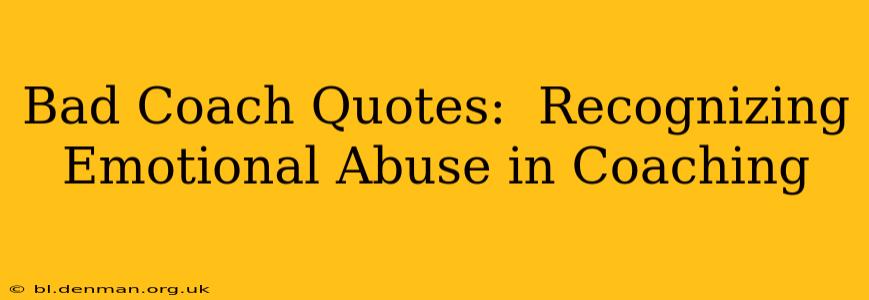Coaches play a vital role in athletes' lives, shaping not only their athletic skills but also their mental and emotional well-being. However, the power dynamic inherent in the coach-athlete relationship can unfortunately create an environment where emotional abuse can flourish. Recognizing the signs is crucial for athletes of all ages to protect their mental health and ensure a positive and productive coaching experience. This article explores common "bad coach quotes" that reveal emotional abuse and provides strategies for navigating such situations.
What Constitutes Emotional Abuse in Coaching?
Emotional abuse in coaching transcends simple harsh criticism. It's a pattern of behavior designed to control, manipulate, and degrade an athlete's self-worth. This can manifest in various forms, including verbal attacks, intimidation, humiliation, isolation, and the systematic undermining of an athlete's confidence. While a coach might offer constructive criticism, emotional abuse crosses the line into a toxic and damaging environment.
Common "Bad Coach Quotes" That Signal Emotional Abuse
Identifying emotional abuse isn't always straightforward. However, certain phrases and comments consistently emerge as red flags. These "bad coach quotes" often indicate a coach's unhealthy approach and the potential for emotional harm:
"You're worthless/useless/a waste of time."
This type of demeaning language directly attacks an athlete's self-worth, fostering feelings of inadequacy and shame. Constructive criticism focuses on performance, not the inherent value of the individual.
"You're too [insert negative trait] to ever succeed."
Labeling an athlete with limiting and negative traits undermines their potential and discourages growth. A supportive coach focuses on strengths and identifies areas for improvement without resorting to personal attacks.
"I'm only yelling because I care."
While intense emotions can sometimes lead to raised voices, this justification normalizes abusive behavior. Yelling, belittling, and public humiliation are never acceptable coaching methods.
"If you were any good, you wouldn't..."
This type of conditional statement places blame solely on the athlete, ignoring potential external factors or systemic issues that might impact performance. Effective coaches acknowledge various contributing factors.
"Everyone else is better than you."
Creating a culture of competition is one thing; fostering an environment of constant comparison and negativity is another. This undermines team cohesion and individual confidence.
"You're letting the team down."
While accountability is important, this phrase can be manipulative, creating undue pressure and guilt. Constructive feedback addresses specific behaviors rather than general accusations.
"Don't you dare cry/show emotion."
Suppressing emotions is harmful. Athletes, like all humans, need to express their feelings. A healthy coach creates a safe space for open communication, even when it involves vulnerability.
"You're lucky to even be on this team."
This statement creates an environment of fear and insecurity, undermining the athlete's sense of belonging and value.
What to Do if You Experience Emotional Abuse from a Coach
Experiencing emotional abuse from a coach can be isolating and distressing. Here's what you can do:
Document the Incidents:
Keep a detailed record of abusive incidents, including dates, times, specific quotes, and any witnesses. This documentation can be invaluable if you choose to report the abuse.
Talk to Someone You Trust:
Confide in a parent, guardian, friend, teacher, or counselor. Sharing your experience can provide support and validation.
Seek Professional Help:
A therapist or counselor can help you process your emotions, develop coping mechanisms, and determine the best course of action.
Report the Abuse:
Depending on your situation, you may choose to report the abuse to school officials, athletic administrators, or other relevant authorities. Many organizations have specific policies and procedures for handling such complaints.
Remember Your Worth:
Emotional abuse is never your fault. You deserve to be treated with respect and dignity, regardless of your athletic abilities.
The Importance of Positive Coaching
Positive coaching emphasizes building athletes' self-esteem, fostering resilience, and promoting a healthy and supportive training environment. It prioritizes individual well-being alongside athletic achievement. Remember, a coach's role extends beyond winning games; it's about nurturing the whole person. If you encounter these "bad coach quotes" or similar behaviors, prioritize your mental health and seek help. Your well-being is paramount.

